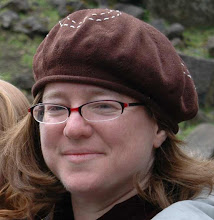 In the 1730s-40s, Abigail Levy Franks (1696-1756) wrote a series of letters to her family. Like many letters, these range from mundane to heart wrenching: in the letter below to her son Naphtali, she wrote of her shock and despair on learning of her daughter's secret marriage to a non-Jew: "Good God Wath a Shock it was when they Acquanted me She had Left the House and Had bin Married Six months I can hardly hold my Pen whilst I am writting it. . . . My Spirits Was for Some time Soe Depresst that it was a pain for me to Speak or See Any one." These letters have been superbly collected and edited by Edith B. Gelles in The Letters of Abigaill Levy Franks, 1733-1748. A brief biography of Abigail Levy Franks is available online at the Center for Jewish History.
In the 1730s-40s, Abigail Levy Franks (1696-1756) wrote a series of letters to her family. Like many letters, these range from mundane to heart wrenching: in the letter below to her son Naphtali, she wrote of her shock and despair on learning of her daughter's secret marriage to a non-Jew: "Good God Wath a Shock it was when they Acquanted me She had Left the House and Had bin Married Six months I can hardly hold my Pen whilst I am writting it. . . . My Spirits Was for Some time Soe Depresst that it was a pain for me to Speak or See Any one." These letters have been superbly collected and edited by Edith B. Gelles in The Letters of Abigaill Levy Franks, 1733-1748. A brief biography of Abigail Levy Franks is available online at the Center for Jewish History.
When reading colonial American letters, it helps to know why early Americans wrote. The eighteenth century is the age of the what is called the "familiar letter"—that is, “a mode of letter writing devoted to the expression of affection and duty among kin, family and friends.” Letters were not merely a way to communicate news: they provided a way to “pursue...claims to social refinement and upward mobility" (Dierks, “The Familiar Letter and Social Refinement in America,” 31.) Letter writing manuals like The Young Clerk's Guide (1708) and The Secretary's Companion (1728) provided scripts for people to follow in order to display their social graces appropriately; handwriting guides helped the writer learn to display her refinement visually. Letters were so popular a genre that many early American novels are written in an epistolary form: that is, as a sequence of letters (for example Hannah Foster's The Coquette [1797]).
Those who want to try their own hand at decoding Abigail's handwriting below may find my Early American Handwriting Game a helpful starting place.

Naphtali Franks (1715-1796).
Letter, June 7, 1743 [written from "Flatt bush"].
Courtesy of the American Jewish Historical Society,
New York and Newton Centre, Massachusetts (25)



0 comments:
Post a Comment